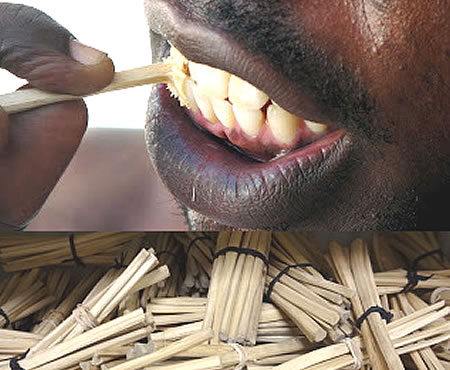The most popular and commonly used oral hygiene kits remain the regular tooth brushes and a plethora of tooth pastes. However, some individuals have adapted traditional chew sticks.
Chewing sticks have become a favourite amongst not just local African folks, but amongst persons of affluence. In Nigeria, almost everyone has at one time or the other used locally sourced chewing sticks for oral hygiene. This has given rise to several studies on the efficacy of local Nigerian chewing sticks against germs that cause infections and tooth decay in the mouth.
In recent times, there has been an increase in the brands of tooth pastes and upsurge in advertorials for mouth washes with claimed high efficacy in their antimicrobial, antibacterial, and antiplaque properties.

While chewing sticks and many of the toothpastes are available and affordable, many of these branded mouthwashes are quite expensive. This has conferred on these mouthwashes an ostentatious status, with many local folks believing they are not as effective as their manufacturers claim.
Mouthwashes are an adjunct to, not a substitute for, regular brushing and flossing for plaque control. Many different mouthwashes are commercially available and are recommended to treat infection, reduce swelling in gums, relieve pain, and reduce mouth odour or to deliver fluoride locally for prevention of holes in teeth.
Massularia acuminate popularly referred to by the Yoruba people of Western Nigeria as Pako Ijebu or Orini Ijebu is one local Nigerian chewing stick that has been highly researched and found good for maintaining good oral health.
Now researchers in a new study have confirmed that extracts from this chewing stick could be incorporated into tooth paste or used as mouth wash for periodontal infections.
In the study, the antimicrobial effect of its water and ethanol extract on disease causing microorganisms in the mouth was compared with that from commonly sold mouthwashes in shops. These were germs collected from the oral cavity of healthy undergraduate students of Delta State University, Abraka.
The study published in the 2016 edition of Journal of Restorative Dentistry involved researchers from the Delta State University, Abraka, Delta State. These are Emudainohwo Joseph Oghenebrorie Tedwins; Owhe-Ureghe Ubreye Benjamin; Ewharieme Daniel Ayobola; Moke Emuesiri Goodies; and Erhirhie Earnest Oghenesuvwe.
They reported that both extracts contain potential antimicrobial substance that can be used in the control of bacterial and fungal infections, thus providing scientific support for its use in the treatment of pero-dental infections.
According to them, this chewing stick when properly used will be more effective in the treatment of pero-dental infections compared to the mouthwash used in this research given that most of the pero-dental infections are caused by bacteria.
But they added that more research should be carried out on the antimicrobial effect of the leaf, stem, and root extract of this plant to ascertain the pharmacokinetics and its mechanism of action.
Previously, researchers have also found indigenously prepared neem and mango chewstick mouthwashes, to be effective in reducing plaque.
The study involved 105 children aged between 12 and 15 years, who were randomised into three groups, namely neem, mango, and chlorhexidine mouthwash groups. Ten millilitres each of herbal and chlorhexidine mouthwashes (0.2 per cent) were administered according to the group allocation twice daily for 21 days.
The researchers, in this study, documented in the 2014 edition of the Journal of Traditional Complement Medicine, found a significant reduction in plague formation in all the three mouthwash groups at 21 days and at one month from discontinuing the mouthwash.
Although Chlorhexidine, the conventional mouthwash component to fight plaque, was more effective in plaque reduction at two months than the neem and mango chewing stick mouthwashes, all the three mouthwashes tested had similar effect on the gum at 21 days (immediately after discontinuing the mouthwash) and at one and two months from discontinuing the mouthwash.
Brushing with neem and mango twigs and chewing neem leaves and seeds after a meal have been the traditional dental care practices in India. Stems of neem contain chemical substances which have ability to prevent swelling and kill germs. Twigs of mango tree have also been used both in the prevention and treatment of periodontitis.
Previously, a study had demonstrated that neem had a good efficacy in the treatment of periodontal disorders. In a small trial from India, it was suggested that a dental gel containing neem extract has significantly reduced plaque index and bacterial count as compared to positive controls (chlorhexidine 0.2 per cent).
A double blind study demonstrated that neem-based mouthwash is highly efficacious and may be used as an alternative therapy in the treatment of periodontal disease.
In addition, researchers also found neem extract gel to be more effective than chlorhexidine mouthwash. Also, in the 2004 publication of the Journal of Ethnopharmacology, they indicated that neem showed better efficacy in reducing human plaque culture and gram-negative bacteria, compared to commercially available toothpaste.
NATURAL HEALTH

:2thumbup Good morning all.
Good Morning Chancey.
:peluk
What dem mean by effective with proper use of chewstick??How does one improperly use a chewstick cuz they didn’t say??Hail Ladies!